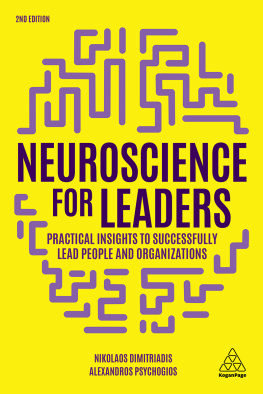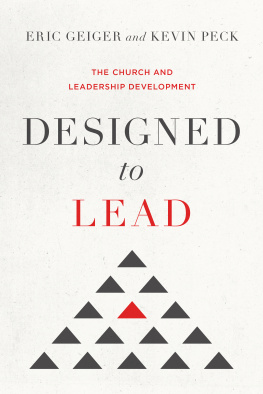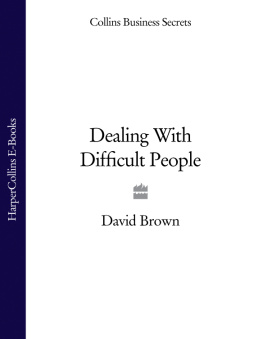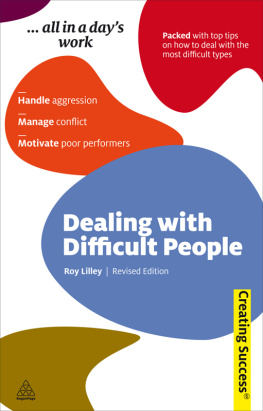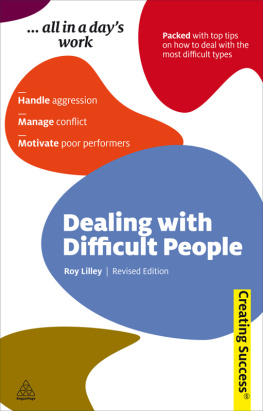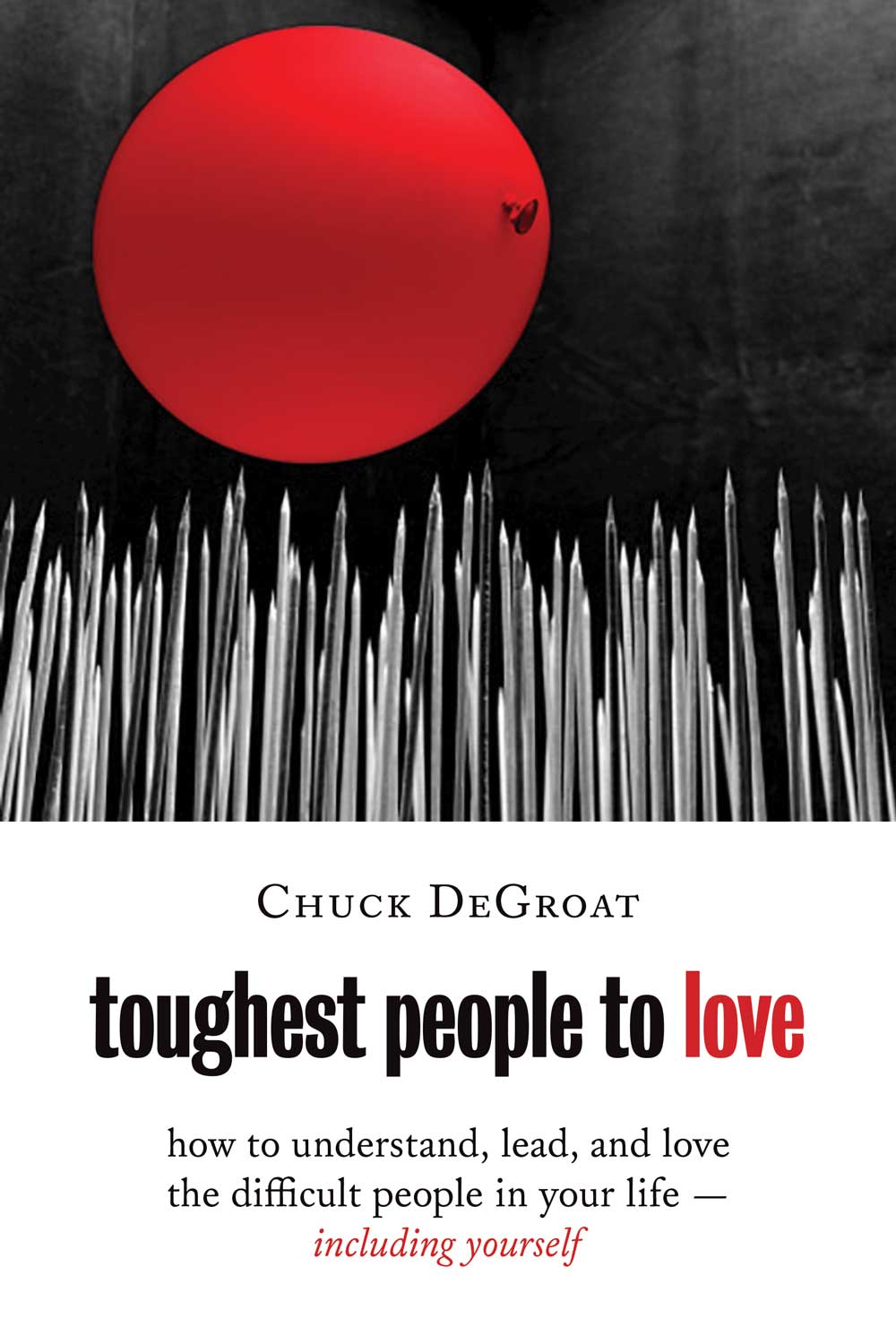toughest people to love
how to understand, lead, and love
the difficult people in your life
including yourself
Chuck DeGroat
William B. Eerdmans Publishing Company
Grand Rapids, Michigan / Cambridge, U.K.
Contents
I am the true vine, and my Father is the gardener.
John 15:1
We keep bringing in mechanics when what we need
are gardeners.
Peter Senge
Youre blessed when you get your inside world
your mind and heart put right. Then you can see God in the outside world.
Matthew 5:8 (The Message)
O rganizational guru Peter Senge wrote one of the best articles on leadership I have ever read. People who know me are aware that Im generally suspicious of so-called leadership experts. But Senge proposed what seemed like a Copernican revolution in leadership, one that toppled the unquestioned principles of management and organizations. He argued that organizations are, in fact, organisms living things like gardens. Challenging modernist leadership assumptions that promote rigid, hierarchical, and mechanistic work environments, Senge envisioned a relational and soulful approach to leading people, one that struck me as wise and much needed.
Senge also challenged the sacred authority of the CEO, the unquestioned and invulnerable leader who leads by control and compliance. He advocated for a new kind of leader: one who is relational, vulnerable, humble, willing to learn (and even fail); one who leads by integrity rather than manipulation. Since I was a young leader myself, Senges words struck me to the core:
Deep change comes only through real personal growth through learning and unlearning. This is the kind of generative work that most executives are precluded from doing by the mechanical mind-set and by the cult of the hero-leader: The hero-leader is the one with the answers. Most of the other people in the organization cant make deep changes, because theyre operating out of compliance, rather than out of commitment. Commitment comes about only when people determine that you are asking them to do something that they really care about. For that reason, if you create compliance-oriented change, youll get change but youll preclude the deeper processes that lead to commitment, and youll prevent the emergence of self-generated change. Again, you end up creating a kind of addiction: People change as long as theyre being commanded to change or as long as they can be forced to change. But, as a result, they become still more dependent on change thats driven from the top.
As a recent seminary graduate and a new pastor, I felt as if Id received a vision for pastoral ministry that had never been articulated in seminary or through my internship process. In my work in a small business and then during my years of seminary studies, I had observed many leaders. Most of them were very strong, but they seemed insecure. They thought it was important to lead from a posture of command and control, but they seemed deeply afraid to be questioned or to fail.
Senge says, We keep bringing in mechanics when what we need are gardeners. As I read his words, it struck me that Jesus had similar things to say. Critiquing the rigid, hierarchical Pharisaism of his day, Jesus turned leadership upside-down empowering the seemingly incapable, telling stories of vineyards and fields and sheep that needed the self-sacrificial tending of the soul-gardeners. Jesus, in other words, was not a command-and-control leader but a gardener of souls.
Now, lets face it command and control works, at least for a time. It gives leaders that all-too-illusive sense of control, particularly when they feel theyre in over their head. Most of us, I suspect, dont want to be leadership bullies. Wed prefer not to lead with an iron fist. But when we feel the inevitable internal chaos that comes with leading people, we default to what seems to work. Most of us are not skilled in the art of leading broken and wounded souls.
Perhaps you picked up this book because you were having a difficult time of leadership yourself, hoping it might give you a bit more control amid the chaos. Perhaps you (like me) crave the ultimate handbook for understanding and fixing people.
This is not that book. Instead, Im offering a bigger vision for human relating, one that might even allow you to relinquish the need for control. Eugene Petersons wonderful memoir, Pastor, reminds us that were called to be contemplative, not competitive. People are not problems to be fixed, Peterson suggests, but image-bearers to be known. As contemplatives, we turn our focus to seeing God in the ordinary moments, in the broken lives of people, and in our own humanness. We lead from a posture of self-sacrificial love the deep secret of Gods kingdom instead of from a posture of competition, control, and manipulation.
If the soul is a garden to be tended to, as all of Gods good creation is, then we must approach the garden with a sense of sacred awe. People are profoundly complex: both beautiful and broken, productive and paralyzed, fruitful and foolish. In my work over the past fifteen years as a pastor, a seminary professor, a therapist, and a church leader, Ive been tempted in my worst moments to see only the problems and failures. Surveying the broken body of Christ, I sometimes opt for the quick and easy cosmetic change rather than the hard work of soul gardening. Too often, Ive abandoned sacred awe for cynicism, self-protection, and fearful reactivity. The best leaders Ive talked to admit the same.
In this book I will address the dark side of people. But Im convinced that in Gods economy of grace, nothing is wasted not our failures, not even our big sins. In our darkest hour, the Father sees us and runs wildly toward us, arms open in joyful compassion (Luke 15:20). He doesnt fear our sinful chaos. Rather, the great Gardener sees an opportunity to cultivate us, to grow us, to renew us. Jesus transforms our little deaths of failure and sin into redemptive opportunities for growth and renewal. As Jesus says, Very truly I tell you, unless a kernel of wheat falls to the ground and dies, it remains only a single seed. But if it dies, it produces many seeds (John 12:24). Our failures are often opportunities for new beginnings.
The Best Leaders: Wounded Healers
One day I decided to Google my name to see what was being said about me in cyberspace. While I was clicking through various blogs and Web sites, it dawned on me that none of them included references to my painful failures and disappointments. Of course, that wasnt what I had Googled my name to see. But the real truth about me cannot be found on Web sites and blogs, not even those I write myself. Who I am today is a composite of many things, from my DNA to the various people in my life to my struggles and failures.
Ive made it a bit of a hobby to study the stories of great Christian leaders, with a special focus on the painful struggles in their lives. I think of St. Augustine, who rehearsed his life of sexual addiction in his famous Confessions. Or St. Teresa of vila, who experienced years of prolonged spiritual dryness. Or Charles Spurgeon, who battled such severe depression that he was frequently unable to preach. Or Catherine of Siena, whose chronic illness was no small factor in her becoming a rare female Christian leader in fourteenth-century Italy. These people remind me to consider my own story, my own difficulty, before presuming to engage the struggles of others.
Perhaps thats why I was so drawn to Lincolns Melancholy, a biography of Abraham Lincoln by Joshua Shenk. The fact that Lincoln was depressed and at times even suicidal is widely known, but I found myself gripped by the particulars of his story: failure, a broken relationship, an imperfect pedigree, a genetic burden. And yet Lincolns own woundedness, the author argues, brought healing to a nation.


